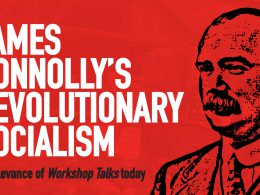By Niall Dooris
On the day that Palestine Action was disgracefully proscribed as a terrorist organisation by the UK government, Zarah Sultana made a surprise announcement on social media that she and Jeremy Corbyn would co-lead a new party. There is clearly massive enthusiasm already, with over 700,000 people having signed up to “your party” at the time of writing. That would make it the largest party in the UK, if signups translate to memberships. That’s exceptional for a nameless organisation that doesn’t fully exist yet. It’s a striking sign of people’s deep need and desire for an alternative to the status quo.
In Britain, things have gone from bad to worse despite the Tories being booted out at the last general election. In many ways, Starmer’s Labour government has been more viciously right-wing by cutting disability benefits and the winter fuel payment to pensioners. This is all in the pursuit of growth that never comes as the economy stagnates, and most people struggle to keep up with the basic cost of living. This is in the context of unprecedented inequality, with “50 families having as much wealth as half the UK population” as Sultana put it.
At the same time, Starmer has embraced the racist framing of immigration, which has now become the British political mainstream, and has escalated the Tories’ campaign of victimising refugees. The government has been a key ally in Israel’s genocide in Gaza. It has been cracking down on Palestine solidarity protests. It has been attacking the rights of trans people by banning puberty blockers and standing over the transphobic Supreme Court ruling earlier this year. All the while Labour is bombing in the polls, and seems destined to be defeated by an ascendant Reform UK at the next election (IPSOS).
This is a terrifying prospect, as Reform represents a dangerous far-right, racist politics that would likely go much further than anything seen before in Britain. For a large chunk of society there is no party that represents them – disillusionment and demoralisation have been rife for years. A new party of the left has been desperately needed for decades, but particularly since Corbyn’s election defeat and downfall in 2019. The potential for this new initiative is immense, and could be truly historic – if it gets off the ground and takes the correct approach to organising the hundreds of thousands of potential activists that are willing to fight for a better society.
Democracy and leadership
Of course, it’s still early days, we’re yet to see what it actually represents and how it organises. The plan put out by Sultana and Corbyn on social media is to have a conference before the end of the year where all members can vote. Everything will be determined by the membership, including the name. This is deeply positive if it’s followed through on – to be effective they will have to be truly open and democratic. They should empower the people who have signed up not just to be passive members but to be activists rooted in local communities. This in and of itself would be transformative and a major step forward in organising the left, which has been disoriented for so long. It is critical that decisions are not made by the votes of a passive paper membership; rather, they should be based on the maximum democratic debate and discussion, via delegate conferences and active local structures. There is a danger of the former approach via the “one member, one vote” approach outlined by Corbyn in a recent interview.
Crucially, the party shouldn’t be a top-down Westminster-oriented project. But the party will need to be balanced with the need for decisive political leadership, backed by the membership, when it is needed. While Corbyn stood by his principles against the onslaught from the capitalist establishment, he often fell into inertia. He crucially failed to take on the right wing within his own party, notably on the spurious argument about anti-Semitism being prevalent in the Labour Party under his leadership. He foolishly conciliated, weakening the project in 2019 and paving the way for Starmer and co. to oust him.
Union support
Representatives of the new party have been making the correct point that they need to become embedded in working-class communities and want to be connected to trade unions, tenancy unions and other community organisations in a way that brings the left and the working class into one movement. It must become the natural party for those active in the Palestine solidarity movement and fighting back against all forms of exploitation and oppression. This would be a transformative step forward from where we are now, to bring potentially tens or hundreds of thousands into political activity in a meaningful way. Whether the new party is successful in elections or not, it would be a force to be reckoned with.
Although Unite the Union, for example, has taken significant steps in partially defunding Labour and even suspending Angela Rayner’s membership due to the cuts to disabled people’s benefits, the trade union leaders are still embedded in the Labour Party. But the trade unions must ditch the Labour Party completely, and should support the new initiative when it takes on flesh. Labour does not support workers; it has shown this in its approach to the recent strike by junior doctors and bin workers in Birmingham and its callous cuts to the disabled.
The unions have the power to change the odds in favour of a real alternative; they give millions of pounds a year to the Labour Party. If this were instead shifted to the new party, it would be a far better use of their members’ money. The resources and support of the millions of workers they represent will be needed because the new party won’t have the wealthy donors that Starmer covets.
Opposing division and racism
However the new party is organised it needs to be uncompromising in its opposition to racism, and present a meaningful alternative to the divide and rule of the approach of the Westminster parties. This means pointing the finger at the powerful and wealthy in society and not at the most vulnerable. Interestingly, a recent poll found that Corbyn is more popular among Reform voters than Starmer is (Merlin Strategy). This blows a hole in Labour’s electoral strategy, that they have to move further to the right to appease voters and shows the potential a real alternative can have even in current Reform strongholds. To their credit, both Corbyn and Sultana have consistently spoken against racism and transphobia, and have not followed the dead-end path of the likes of George Galloway, who has embraced the disgraceful “anti-woke” rhetoric of the far-right.
Corbyn and Sultana have also been consistent on the need to end poverty and inequality. The new party will likely embrace the best aspects of Corbyn’s progressive policies in 2019. In fact, they will need to go much further than this because of how much the world has changed for the worse and the cost of living crisis has impacted people. Vital elements of any programme must include mass council house building, reversing all austerity measures and transforming the austerity-battered public services such as the NHS, bringing the major privatised utilities into public ownership and taxing the super-rich. Crucially, it means fighting for an economy that prioritises the needs of the majority and our environment – this means breaking with the rule of the City of London and big business generally, by taking the key sectors of the British economy into public ownership, putting workers at the heart of running society.
Gaza genocide
The genocide in Gaza is the most pressing issue of our time, and the British government is deeply complicit in it. The new party must be unapologetically against the genocide in Palestine and the terror of the Israeli state. It must support full freedom for the Palestinian people, ending the occupation, apartheid and supporting the right of return for Palestinians. This will likely be a central part of the new organisation anyway, as Sultana and Corbyn have been consistently active in protesting against the genocide and for the rights of Palestinians. Importantly, this issue is linked to an already active movement that has brought millions onto the streets in Britain over the last two years.
Additionally, the new party must be uncompromising in its support for the rights of trans and non-binary people. This includes opposing the Supreme court ruling and the banning of puberty blockers. Trans healthcare should be available on the NHS, it is a human right. An estimated 100,000 people marched at Trans Pride in London in July, showing the anger that exists at the attacks on the trans community and that many are willing to fight to resist it. The left has to stand up against the divide and rule strategy and hateful rhetoric of the media and politicians; an attack against one is an attack against us all.
What about the Greens?
The Greens in Britain have more recently been seen by some as a left alternative, with many on the left joining them since 2019 in the hope that they would become a new mass party of the left. Zack Polanski is running as the leader of the party on a left populist programme. At the time of writing results are not out yet. If he wins there could be a significant shift to the left in the Greens approach and he has said they would be open to co-operating with the new left party. However, the Greens have real limits, having repeatedly stood over austerity at local level. They have significant conservative elements within them that don’t want this shift to the left, represented by the other leadership candidate Adrian Ramsay.
Their perception among the public is as a single issue party that attracts many middle-class voters in rural England. This was largely a true one until a massive void on the left opened up after Corbyn’s defeat in 2019. By comparison, Corbyn and Sultana’s organisation has attracted hundreds of thousands of signups in days. The attention has shifted away from the Greens and for most the new party immediately represents a far better prospect of meeting their desire for transformative change. The Greens have been too mild and too slow to change, but we can only wait and see what direction they take and if that will have an impact.
What about the North?
As of yet we don’t know if the new party will be active in the North. During Corbyn’s leadership, the Labour party did not run candidates or do any political activity in the North. This was despite around 3,000 signing up in the North when Corbyn won the leadership election in 2015. This was partly motivated by an unwillingness to get involved in the North’s complicated and divisive politics. Also, by a mistaken idea that Sinn Féin is a progressive left political force, despite being in the Executive since its creation and having been complicit in the implementation of austerity here, along with a swathe of other right-wing policies that have passed through Stormont, including the recent ban on puberty blockers. We need an anti-sectarian left alternative in the North.
It is likely that thousands in the North have already signed up to ‘your party’. If they are mobilised it can pose a real viable alternative to the sectarian parties. The only way it can be done is on the basis of both communities in a consciously anti-sectarian way around a socialist programme. Corbyn has already said that Scotland and Wales will have autonomy on how they run the new party within their own country. He failed to mention the North, but this opens up the opportunity for an initiative to be taken linked to the new party by people in the North whether the leadership of the party favour it or not, this would be really positive and should be supported.
Socialism or barbarism
It shouldn’t be in doubt that this new left party represents a massive opportunity for workers and young people to begin to take matters into our own hands. In place of doomerism and apathy there can very quickly be enthusiasm, as expectations of what is possible are raised. We can move closer to the realisation that collectively we can reshape society in our own image under our own control.
The fact is very little of what I outlined above can be achieved within the bounds of capitalism, and never in a fulsome or lasting way. We cannot control what we don’t own and we cannot reshape society while the economy is primarily owned by a small group of people with opposite interests to our own, or with state institutions that are designed to serve the interests of capitalism. Zarah Sultana said in her initial announcement: “In 2029 the choice will be stark: socialism or barbarism”. Barbarism will definitely be on offer, but to have the option of socialism means fighting for a new type of society, and a fundamental break with capitalism. This requires a revolutionary mass movement, and the process of building a mass socialist party in the UK can be a vital part of bringing such a movement about.












